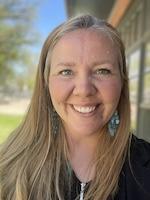Fostering Interstellar Connections in the Online School Universe
,
Colorado Convention Center, Bluebird Ballroom 2BC
Presenters



Session description
Purpose & objective
Purpose and Objectives:
This session is designed to provide educators and institutions with practical insights and strategies for fostering responsible digital citizenship, enhancing student relationships, and boosting engagement in online learning. We will also include valuable information regarding the infrastructure that we use to support our online school both at the district and school levels.
Our hope is that we are able to help shift the narratives around online education that linger from experiences in pandemic learning, to understanding how online schools embraced what was learned in the pandemic and have adapted to create innovative and supportive structures for students necessary. Participants will have time to discuss this shifts, to explore their own relationships to online learning, as well as walk away with real strategies to try and hopefully, new partnerships to lean into when developing and working in their online school environments (in whatever role)
Educational Challenge:
In the online education landscape, a fundamental challenge lies in cultivating responsible digital citizens while fostering meaningful student relationships and maintaining high levels of engagement.
Technology Intervention:
We will discuss specific educational technologies and tools that facilitate responsible digital citizenship, enhance student relationships, and boost engagement. These tools will be demonstrated and their practical applications highlighted.
Models Employed:
Our session will showcase successful models from our K-12 online school. These models emphasize not only responsible digital citizenship but also active student participation, mentorship, and community engagement as key elements for nurturing student relationships and promoting engagement.
Lesson Plans and Instructional Strategies:
Participants will engage in interactive discussions and activities to explore responsible digital citizenship, relationship-building skills, and engagement strategies. Sample lesson plans and instructional activities will be provided, with a focus on adaptability to various educational contexts.
Evidence of Success:
Throughout the session, we will share concrete examples and stories from our experiences. We will highlight measurable outcomes, such as increased student engagement, improved relationships, and the positive impact on the broader community, both locally and globally. These outcomes serve as compelling evidence of the effectiveness of our approaches in preparing students for a future in a rapidly evolving digital world.
Outline
All times are approximate--this can be adapted as needed!
Welcome & Introduction: (15 minutes)
Whos Who in the Room (introduce all of the members of our team here that day, as well as our student and staff presenters)
About Our School (I Am LaunchED presentation with our student voices)
Turn & Talk: How is your current online school similar (or the school that you are planning to develop)? What structures are different?
Integrated Q & A: (20 minutes) Panel of teachers and students and leaders from the district will share the core components of building relationships in LaunchED--and the lessons we have learned. This will largely be a focus on the student and teacher experience (with additional info provided by school and district leadership)
Open Questioning: Questions from the audience about our process, etc. The goal in this time is for people to really share a bit about what they are doing in their online schools and dig into our journey to understand how they should engage in the next section.
"Station Rotation" Table Talks (30 minutes and more!)
During this time, we will divide the room up into various roles in our online school and participants will select the table or area that they identify with or have additional questions or want to dig into the topic more. (Student/Family, Teacher, Leadership, Technology Department). Each station will do the following:
1. Share resources that can be replicated at the other online schools (ie. district tech security agreement, student advisory team plans, etc).
2. Participate in a discussion about the deeper learnings and experiences of this facet of online learning.
3. Review research, articles, resources that provide additional background information.
Supporting research
Since the pandemic (and even before), multiple studies have focused on personalized and blended learning as a deeper learning experience for students. In our work, we have leaned into critical studies that help guide our work in continuing to envision the future of online learning, especially in the K-12 environment:
See attached Google Drive link with PDF articles: https://drive.google.com/drive/folders/1DrgzkTOK58wGsMIxrUeqETa4E-POXgyj?usp=sharing
Handbook of Research on K-12 Online and Blended Learning. Edited by Richard E. Ferdig and Kathryn Kennedy and ETC Press 2014
Teacher Perceptions of Learner-Learner Engagement at an Online High School by Jered Borup; George Mason University
Will a teacher’s small talk in an online lesson have an impact on the students’ satisfaction in learning experience? A quasi-experimental study by one-way ANOVA by Bernie C. N. Mak, Hong Kong Baptist University Mike H. L. Chui, The Education University of Hong Kong
Teacher and student perspectives on facilitating a sense of community through an online high school’s “shepherding” program
Jeffery S. Drysdale and Charles R. Graham
Brigham Young University, USA
Jered Borup
George Mason University, USA
Session specifications
Laptop: Chromebook, Mac, PC
Tablet: Windows, Android, iOS
Empowered Learner
- Students articulate and set personal learning goals, develop strategies leveraging technology to achieve them and reflect on the learning process itself to improve learning outcomes.
- Students use collaborative technologies to work with others, including peers, experts or community members, to examine issues and problems from multiple viewpoints.
 Return
Return Participate and share: Interactive session
Participate and share: Interactive session  Trips and Tours
Trips and Tours Streaming Session
Streaming Session Recorded Session
Recorded Session